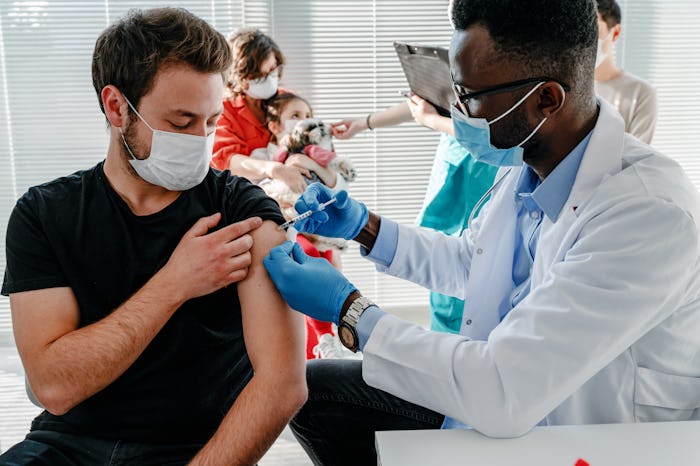Coronavirus

New CDC Study: It’s Rare For Vaccinated People To Spread COVID-19
A real-world study of vaccinated individuals saw the risk of infection drop significantly two weeks after they received their second dose.
A real-world study from the U.S. Centers for Disease and Prevention (CDC) has shown the Pfizer and Moderna vaccines are highly effective in reducing the risk of infection from COVID-19. In studying both vaccines’ effectiveness in a real-world setting, the CDC found the risk of infection among vaccinated healthcare personnel and first responders fell 90% two weeks after individuals received their second dose of the vaccine.
“This study shows that our national vaccination efforts are working,” CDC Director Rochelle P. Walensky said in a statement. “These findings should offer hope to the millions of Americans receiving COVID-19 vaccines each day and to those who will have the opportunity to roll up their sleeves and get vaccinated in the weeks ahead.”
The CDC’s study examined vaccine effectiveness over the course of 13 weeks in 3,950 participants spread across six states. None of the study’s participants had ever had COVID-19 prior to the study and all were deemed to have a high-risk of exposure to the virus due to their roles as healthcare personnel and first responders. More than 62% of participants received both doses of a COVID-19 vaccine during the study while just over 12% of participants received just one dose. Researchers regularly collected nasal swabs and questioned participants about potential symptoms of illness to monitor for infection, including asymptomatic illness.
Researchers found that, as earlier clinical trial data has shown, both the Pfizer and Moderna COVID-19 vaccines were significantly effective at preventing infection. Just one dose of a vaccine was shown to prevent 80% of infections two weeks after it was administered. The second dose prevented 90% of infections by its two week mark.
“It takes about two weeks following each dose of vaccine for the body to produce antibodies that protect against infection,” the CDC explained in a press release issued alongside the study. “As a result, people are considered ‘partially vaccinated’ two weeks after their first dose of mRNA vaccine and ‘fully vaccinated’ two weeks after their second dose.”
According to the CDC, the study found an infection rate of 0.04 infections per 1,000 fully vaccinated participants per day. Among participants who had only been partially vaccinated, the rate was 0.19 infections per 1,000 participants per day. In unvaccinated people, the rate jumped to 1.38 infections per 1,000 participants per day.
The study’s findings suggest that, contrary to early concerns, individuals who have received a COVID-19 vaccination are unlikely to contract an asymptomatic COVID-19 infection and thus pass the virus on to non-vaccinated people.
That’s good news for those hoping vaccines will help bring about an end to the current pandemic. But while more and more states are expanding their vaccine eligibility, public health officials have warned of a potential fourth wave of COVID-19 infections following upticks in case numbers. According to ABC News, at least 23 states and Washington, D.C. have reported an increase in COVID-19 cases while 13 states have reported an increase in COVID-19 deaths.
“When you're coming down from a big peak and you reach a point and start to plateau, once you stay at that plateau, you're really in danger of a surge coming up," Dr. Anthony Fauci, the nation’s top infectious disease expert recently told Face the Nation. “And unfortunately, that's what we're starting to see.” Fauci and other public health officials have encouraged U.S. residents to continue to follow COVID safety measures like frequent hand washing, face masks, and social distancing until more people are vaccinated against COVID-19.
If you think you’re showing symptoms of coronavirus, which include fever, shortness of breath, and cough, call your doctor before going to get tested. If you’re anxious about the virus’s spread in your community, visit the CDC for up-to-date information and resources, or seek out mental health support. You can find all of Romper’s parents + coronavirus coverage here.